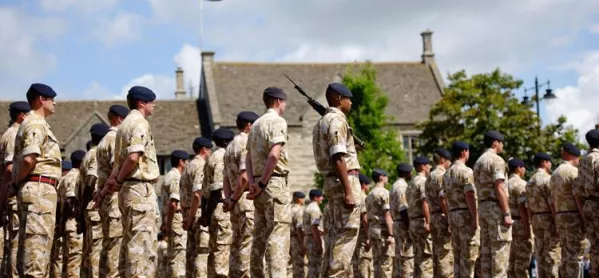Plans to give veterans a £40,000 bursary to tempt them into teaching are unlikely to make much of a difference to the deep recruitment crisis afflicting the profession, unions are warning.
The government has said that, from September, veterans who begin undergraduate teacher training courses in certain priority subjects will be eligible for a £40,000 bursary.
The bursary will be paid in the final two years of a three-year course. It replaces the Troops to Teachers scheme, which has been criticised for its low take-up.
The new bursary is open to applicants who are undergraduates, have left full-time employment with the British Army, Royal Air Force or Royal Navy in the past five years and are interested in studying maths, biology, chemistry, physics, computing or modern foreign languages. Applicants must also meet the usual ITT eligibility criteria.
It comes as the latest Ucas figures on teacher recruitment for September 2018 show numbers down 23 per cent on the same time last year.
‘Cohesive strategy’ needed
While unions say they welcome attempts to recruit more teachers, they fear the latest approach amounts to a “piecemeal” move that will fail to have much impact.
Geoff Barton, general secretary of Association of School and College Leaders, said: “We welcome any initiative to recruit more people into teaching, because there are severe teacher shortages in many schools in many parts of the country.
“However, we do need a cohesive strategy which works on a large scale, rather than piecemeal announcements which, with the best will in the world, are unlikely to make a huge difference to numbers,”
And Paul Whiteman, general secretary of the National Association of Head Teachers, said: “New schemes for teacher recruitment are welcome but unless money is also spent addressing retention, ultimately nothing will really change for schools.”
Nansi Ellis, assistant general secretary of the NEU teaching union, added: “What teachers need to see is a fundamental change to their working lives that enables them to improve their work-life balance and to teach according to pupils’ needs rather than the latest political diktat, not one-off incentives such as this.
“One off, small-scale initiatives like this may help individual career changers but they are not the solution to the deep problems faced by schools.”
Supporting the troops
Troops to Teachers was announced in the Conservatives’ election 2010 manifesto. The University of Brighton has delivered the scheme since 2013, with the first cohort of trainees starting in January 2014.
It was hoped that 180 recruits would be taken onto the two-year scheme. But at the end of two years, it emerged that just a sixth of the target numbers made it through to become fully-qualified teachers - prompting Labour to describe the scheme as a “flop” and said the government was “failing to focus” on teacher shortages.
In total, 106 service-leavers have now become fully-qualified teachers, with a further 96 trainees still on the course.
Some of those who qualified through Troops to Teachers faced challenges. The scheme had the straightforward premise of bringing the talents of motivated men and women into schools and fulfilling the Armed Forces Covenant - the nation’s promise to support ex-service personnel.
But Department for Education comments about the need for “military discipline”, combined with a perception that people with a military background would be shouting sergeant majors, meant that finding schools for trainees was “tricky” and resulted in trainees keeping quite about the route they had taken into teaching when going for new jobs.
Referring to today’s announcement, Damian Hinds, education secretary, said: “Our ex-servicemen and women - who have already contributed so much to our country - have a wealth of experience and expertise that can be shared in the classroom, teaching pupils the knowledge they need to succeed alongside vital skills, such as leadership and self-discipline.”
Want to keep up with the latest education news and opinion? Follow Tes on Twitter and like Tes on Facebook




